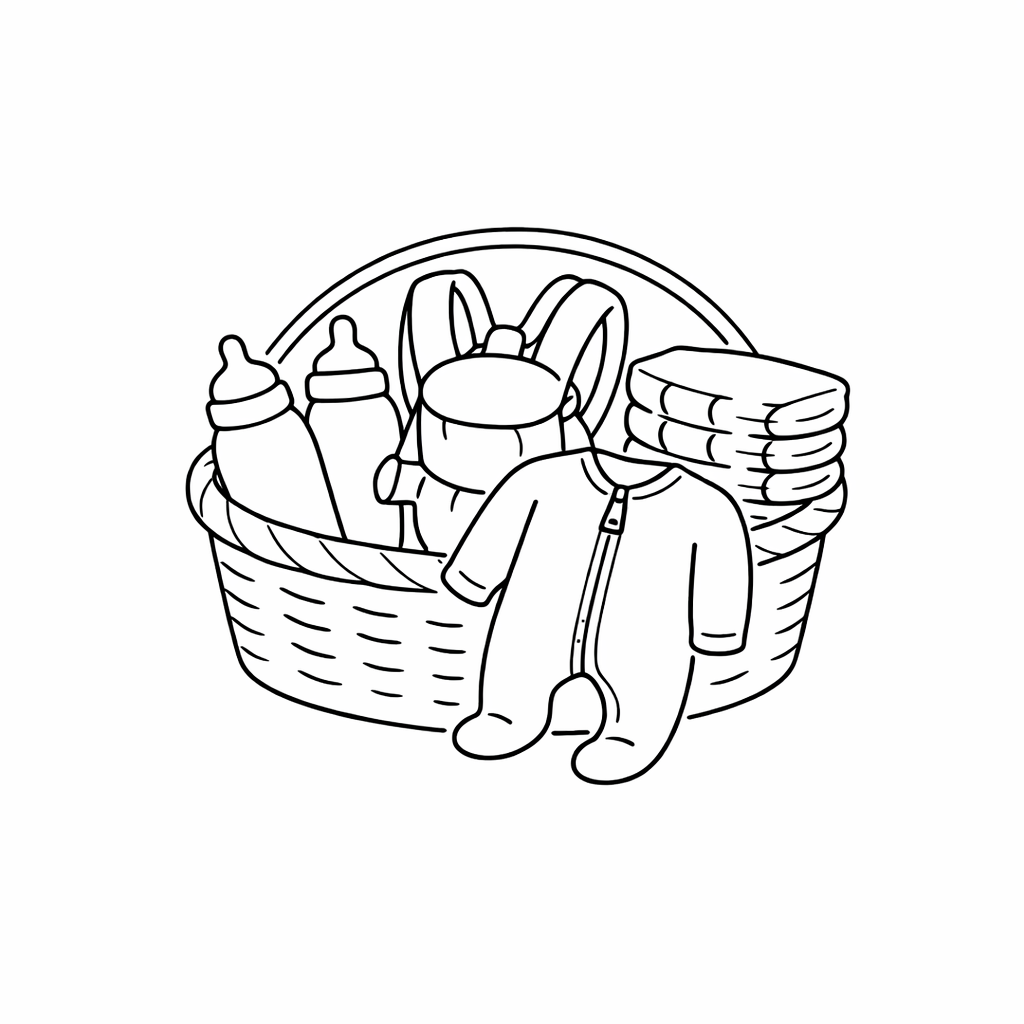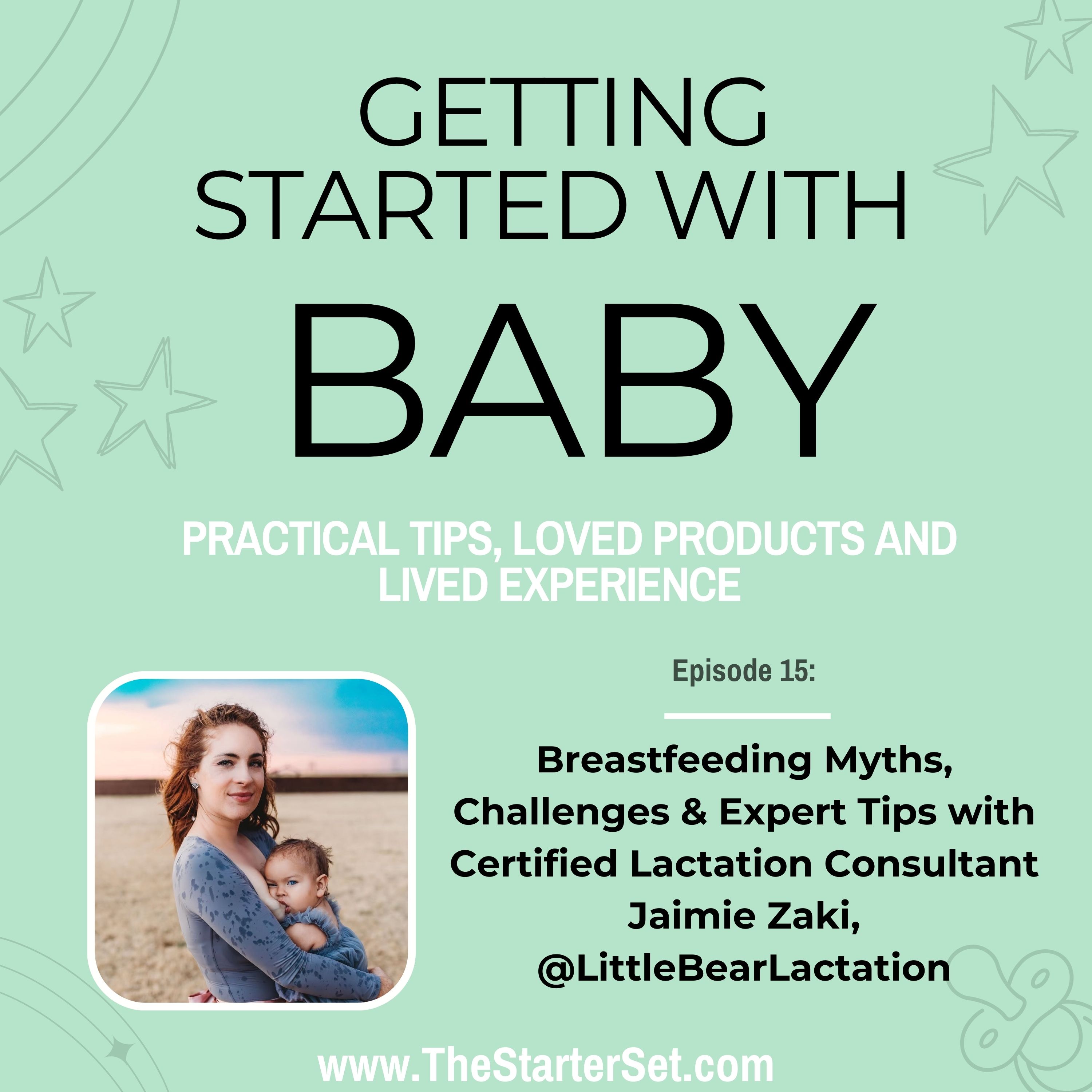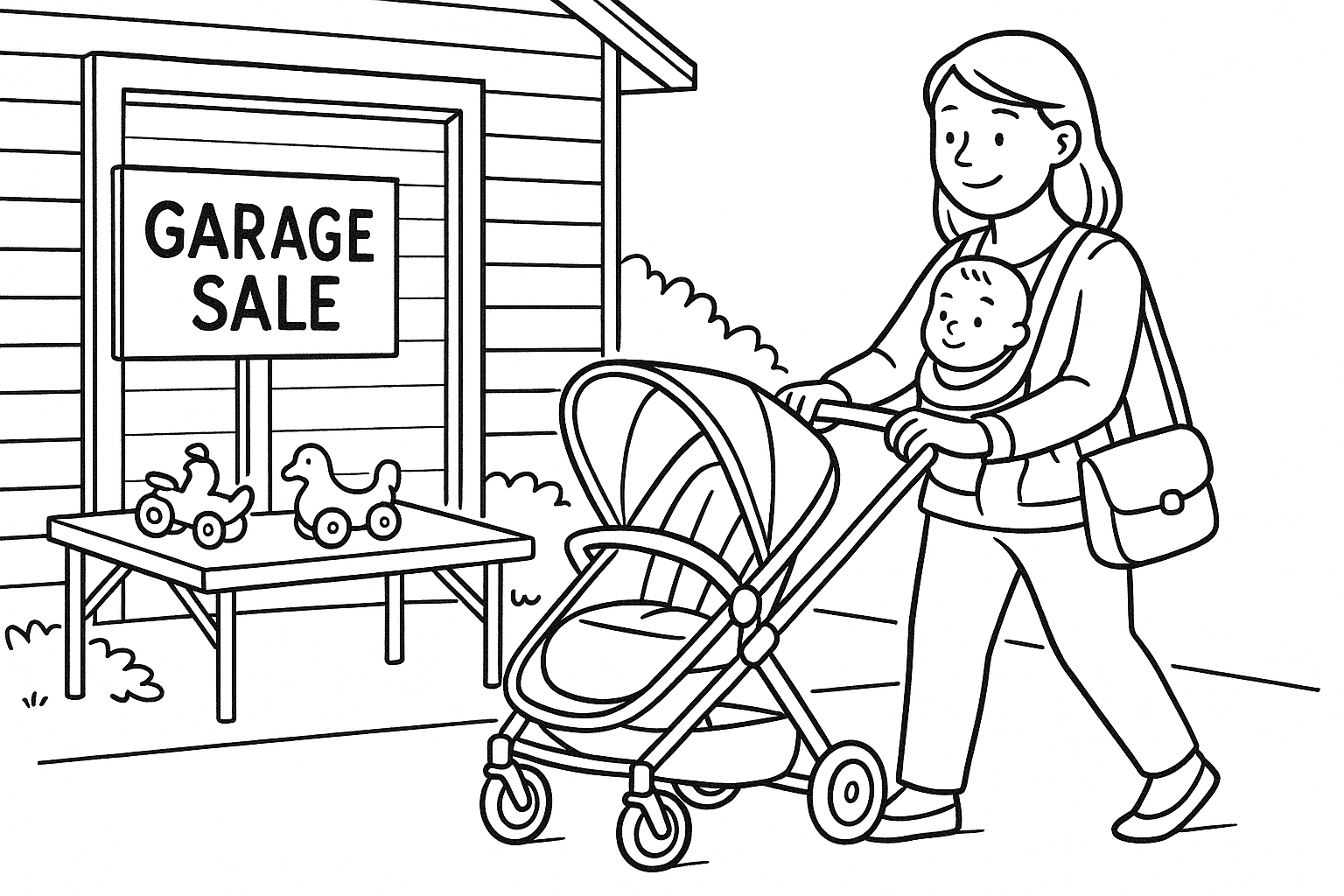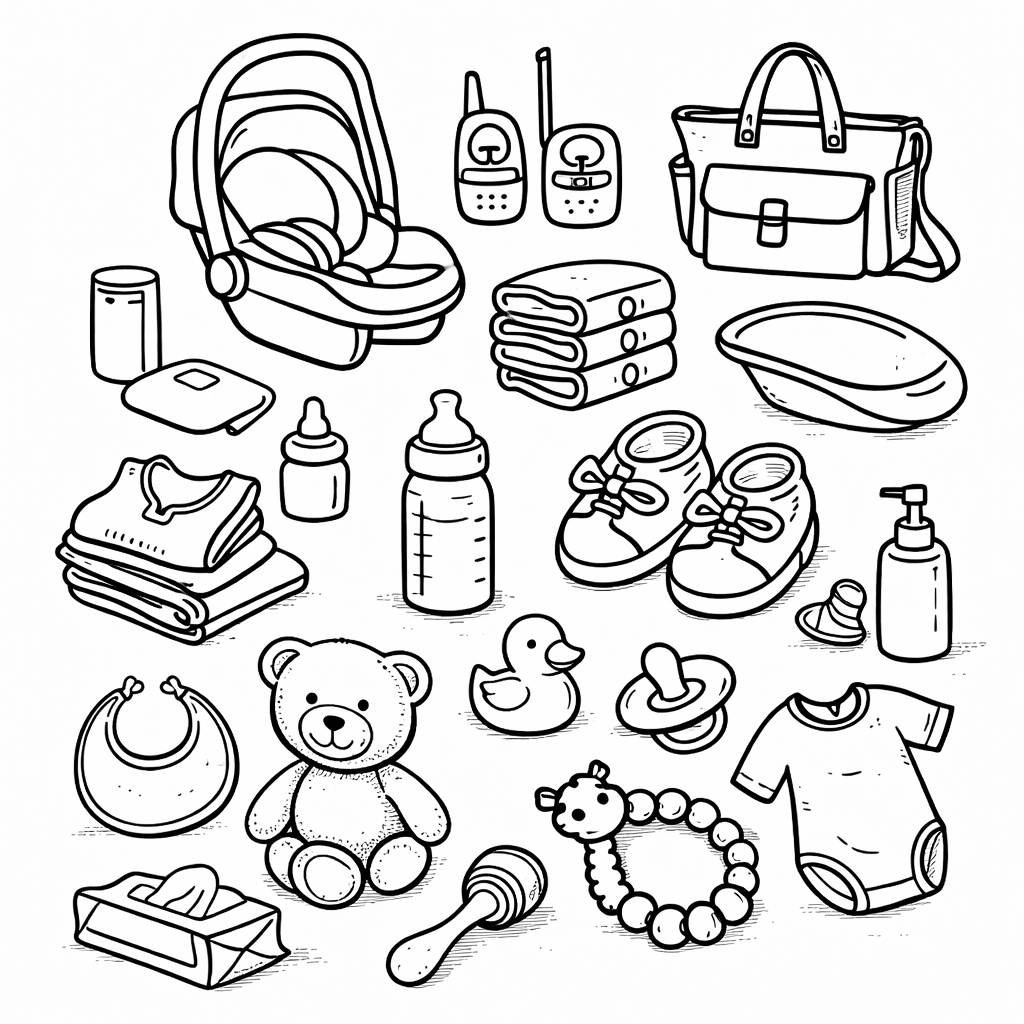Have you ever wondered what your OB is really thinking? What's her perspective on what matters during pregnancy and postpartum? This week we're talking with Dr. Caledonia Buckheit (@calibmd), an OBGYN with the Kamm McKenzie Medical Group in Raleigh, North Carolina, and a mom of two. We’ll cover everything from early pregnancy anxieties to fetal movement to postpartum bleeding. You’ll get the insider perspective on what to expect from your prenatal appointments, what questions you should be asking, and which pregnancy worries you can simply let go of.
Note: Information in this episode is based on personal experiences and is provided for educational and entertainment purposes only. Information in the podcast does not constitute personal professional advice. We encourage you to independently evaluate any content and consult with appropriate professionals as needed for your specific circumstances.
Getting Started with Baby Podcast
A Few Key Quotes
On the reality of miscarriage prevention:
"The vast majority of miscarriages when they occur are not because of some external factor. It's usually because either the sperm or the egg had an abnormal genetic complement, or when they got together and started replicating, there was an error...We have no control over that." — Dr. Buckheit
On trusting your body during labor:
"If you are in labor, the contractions will become more painful, more frequent, more intense, and they won't go away...You don't need to stress and worry and keep yourself up all night because you've had a couple of contractions...It will declare itself." — Dr. Buckheit
On the big picture perspective:
"Trust the process. Try your very best not to sweat the little things. And big picture, statistically, most people do quite well during their pregnancies, and most moms and babies do quite well." — Dr. Buckheit
The Takeaways
- You can't prevent most miscarriages, and that's not your fault: Over 90% of early miscarriages are caused by genetic factors that are completely beyond your control. Outside of staying hydrated, getting sleep, and avoiding toxic exposures, there's nothing you can do to prevent a miscarriage. If you experience one, you didn't do anything wrong—this understanding can help reduce the overwhelming pressure many women put on themselves during early pregnancy.
- Your body will tell you when it's time: Labor and water breaking aren't medical emergencies despite how they're portrayed in movies. These are natural processes that "declare themselves" overtime. For first-time moms, over 90% will experience a slow, progressive labor with plenty of time to get to the hospital. You don't need to stress about missing the signs.
- Understand fetal movement baselines in the third trimester: There's no such thing as too much fetal movement—if your baby is moving, that's good news. What you should watch for is decreased movement from your personal baseline. After 32 weeks, every pregnancy should be able to get 7-10 noticeable movements in two hours, but your normal might be much more active than that. A significant decrease from what's normal for you is when you should call your provider.
- Postpartum recovery should steadily improve: Whether you have a vaginal delivery or C-section, think of postpartum as a surgical recovery. You should feel a little bit better every single day. If you're experiencing new symptoms or if something that was improving suddenly gets worse, that's a sign you should contact your provider.
- Be smart about food safety, not fearful: Rather than memorizing lists of forbidden foods, understand your risks—Listeria for example lives in cold environments and can be on almost any food. To reduce your risk, focus on washing and preparing more food at home, avoiding communal food sharing like buffets, and understanding how your food is processed before it reaches your plate.
- You don't need to stress about prenatal bonding activities: While reading to your baby in utero or playing specific music can be nice for parental bonding, babies benefit from your normal daily life—your conversations, the music in your car, and just living in your body.
- Keep it simple and leverage your community - Babies don't need tons of clothes, socks, or headbands when they're little. Focus on simple swaddles and skin-to-skin contact. Build community with other parents for hand-me-downs rather than buying everything new.
Dr. Buckheit's Baby Product Picks
The Full Conversation
[edited from audio transcript for clarity]
Jane Dashevsky: Have you ever wondered what your OB is really thinking? What's her perspective on what actually matters during pregnancy and postpartum? Today we're getting those answers straight from Dr. Caledonia Buckheit, an OBGYN with the Kamm McKenzie Medical Group in Raleigh, North Carolina. And, she's a mom of two. She'll share what to expect, what questions you should be asking, and which pregnancy worries you can simply let go of.
Pregnancy and the postpartum period—they're just a time when parents have so many questions. And I know Dr. Buckheit, you are a mom as well, so I'm sure you had questions too. We're really excited to get your perspective.
Dr. Caledonia Buckheit: Well, thank you so much for inviting me to be on the podcast. I'm happy to be here.
Jane: To get into it, it would be great if you could introduce yourself and tell us a little bit about your background.
Dr. Buckheit: I'm Caledonia Buckheit. I'm from Maine originally, and I did my college and medical school in the northeast. I went to Dartmouth for medical school and then came down to North Carolina to do my OBGYN residency at Duke. My husband and I really loved it here and decided we wanted to stay and start our careers in the Raleigh area. I've been with Kamm McKenzie, which is the largest private practice group in Raleigh for OBGYN care, for three years now. I have two daughters—the oldest is turning six on Friday and the youngest is three and a half.
Jane: Oh nice, happy early birthday to your daughter!
Jane: When you become pregnant, especially for the first time, it's this whole new experience. I know for me, I wasn't sure what to expect. Something that a lot of moms think about is what should they expect from their OB?
Dr. Buckheit: I thought a lot about this leading up to this podcast. What I do day in and day out with obstetric prenatal care—really, I see my role as basically identifying risk factors and medical problems, making plans for those things to keep mom and baby safe. But then other than that, it's really a surveillance and monitoring role and being a resource.
For an uncomplicated pregnancy, if you're lucky enough to have a very short problem list during your pregnancy, most of your appointments are really just check-ins. We're doing a weight, blood pressure, measuring your belly, making sure baby is measuring on track, listening to baby. And then really just responding to and answering questions about what's going on for that particular patient.
Jane: I think for a lot of moms, especially with your first pregnancy, you're just so excited to get to see the baby move or hear the heartbeat. But it's interesting to hear it from the other side.
Dr. Buckheit: That new OB visit when you're first establishing care—you really want to get a sense of who is this person who's pregnant, what do they have going on, and what specific things are we going to have to do for their plan? Because everyone's plan really is different based on whatever risk factors they have, unless you really have no risk factors at all. Then it's just the standard prenatal care that everyone gets.
Jane: You mentioned that parents will come in with questions at times. What are some of the common questions that you get?
Dr. Buckheit: I think there are a lot of questions. In early pregnancy, there's a lot of anxiety, and we field a lot of questions about: should I be getting bloodwork done to monitor and confirm my pregnancy? How many ultrasounds should I be getting, how frequently? I'm thinking about that before ten weeks—there's just a lot of anxiety and angst that comes during that time. And I think understandably so, because that's really the timeframe where unfortunately we see one in four pregnancies are going to end in a miscarriage.
Almost always it's not because of anything you did or you didn't do, which I think is just hard for people. They're like, "What can I be doing to prevent a miscarriage?" I'm like, literally nothing. Assuming you're not smoking and doing drugs and things like that, but you're living a normal, healthy life, there's unfortunately not much that you can do to alter the course of a pregnancy. So I field a lot of questions and manage a lot of anxiety in that early pregnancy stage and just provide reassurance that time will tell and we just have to watch and wait.
Once you clear that 10 to 14 week hurdle and you're getting into the second trimester, then miscarriage and pregnancy loss becomes much, much less common, so you can provide that reassurance. Usually people's anxiety starts to shift to different things. The next questions are often about: should I be monitoring my baby with a Doppler at home? When should I expect fetal movement, and what is that movement going to be like?
I joke that when I was pregnant as an OBGYN—I was a resident when I was pregnant with my first and my second—being a resident and knowing all the many horrible things that can happen with pregnancies that luckily usually don't happen, what I was worried about and what I was scared about just changed throughout the pregnancy. But there was always something.
Jane: By the way, I didn't get a Doppler, but I definitely got a stethoscope so we could try to listen to the baby. I don't think it was very effective.
There was something you said about how in the early days, people have so much anxiety about what can they do to prevent a miscarriage. I was actually just listening to a different podcast a couple days ago where they were talking about how much pressure the mom was putting on herself to do everything right in the pregnancy, and if something were to go wrong, how she would blame herself for it. That seems like a really common thing. Do you have any advice for moms facing all that anxiety?
Dr. Buckheit: The vast majority of miscarriages when they occur is not because of some external factor. It's usually because either the sperm or the egg had an abnormal genetic complement, or when they got together and started replicating, there was an error and therefore it can't continue developing. We have no control over that. I think just understanding that the cause of greater than 90% of early miscarriages is genetic factors—there's literally nothing you can do about it.
You have to watch and wait and understand that outside of just staying hydrated, getting sleep, avoiding toxic exposures, that's really all you can do. And if you're doing that and you have a miscarriage, you didn't do anything wrong.
Jane: Hopefully that can give people some relief because it's a lot to take on.
Jane: It's super interesting that you have this background as an OB and you have all the knowledge behind the curtain, but also have experienced pregnancy and motherhood yourself. Talk to me a little bit about what that was like and what kind of questions you had, knowing some of the information that you already knew.
Dr. Buckheit: With my first pregnancy, I was very lucky to have a very low risk, uncomplicated pregnancy. I tolerated pregnancy pretty well. I wasn't super sick. I was able to stay active and work, and I didn't develop any major complications. I think that was good to experience a healthy, normal pregnancy because I feel like I have a good baseline from my career, but also personally. I understand what a normal, healthy pregnancy entails. When I'm talking to patients and they're telling me about what they're experiencing, I'm able to use that as a reference point, which I think is very helpful.
I also, in my second pregnancy, developed a very severe complication and ended up delivering at 27 weeks and experiencing the NICU. I myself was in the ICU. So I know also what a very complicated pregnancy can feel like too. I think my experience as somebody having babies and being a mom has made me a better doctor for sure. I'm also careful not to expect my patients to have the same experience that I have, because there's a lot of variety in how different bodies and different people experience and tolerate pregnancy.
Jane: That must have been really scary with the second one.
Dr. Buckheit: That really taught me that complications can happen to anyone. I know this as a physician, but it just really illustrated that because my first pregnancy was so low risk and uncomplicated and boring. I really did have the expectation—because you're always taught history is a very good predictor, usually similar things will happen in a future pregnancy. I think I was really caught off guard by having such a severe complication when I had had no warning signs or lead up to give me a heads up that that would potentially be the case.
Jane: Are there warning signs that people should look for? It sounds like in that case there weren’t, but is there something that parents should look for?
Dr. Buckheit: We talk a lot about risk in obstetrics. I see a huge part of my role as just mitigating risk because most of the time bad outcomes are not going to happen. We're really just doing all of these interventions and monitoring to prevent a bad outcome, essentially.
I'll give hypertensive disorders of pregnancy a spotlight here because they're unfortunately pretty common, affecting like 5 to 10% of pregnancies. There are very clear risk factors for developing hypertensive disorders of pregnancy, and that's something we review at the beginning of your pregnancy. We put people on aspirin to prevent pre-eclampsia. There are things that we can do to monitor and mitigate risk around hypertensive disorders, and also educating that patient who has advanced maternal age and IVF pregnancy, a history of gestational hypertension in a prior pregnancy. That patient has had that education that this is something we're looking out for. These are the warning signs we're going to be looking for—your blood pressure, your symptoms at every single appointment. That patient is kind of on guard and understands that their risk for that is quite elevated.
What happened to me was I developed an infection with Listeria. Something like that, I didn't really have any risk factor for other than the fact that I was pregnant and my immune system was different because of that. That's a little harder to predict because there was no education or changes you can make to a prenatal plan to reduce the risk, other than just your standard advice around food safety that we give everyone at the beginning of pregnancy.
Jane: I remember the Listeria warnings as well, and there were certain foods that you were told definitely to avoid. Can you share what some of those common ones are?
Dr. Buckheit: The common ones that we talk about are cold cuts like deli meats, soft cheeses, raw fish, raw meat. But the reality is that Listeria lives in the cold and can literally be on almost any food product. We're talking bagged salads, frozen waffles, ice cream, anything. I think that's frustrating and hard.
Instead of telling people this list of arbitrary foods, I basically try to educate around understanding how Listeria lives and dies and understanding how your food is processed before it gets to your plate. Because if you understand that, then you can make educated choices about your foods. For example, buying the whole cantaloupe, washing it yourself and cutting it up yourself—you're going to limit multiple steps of potential contamination.
Jane: That's actually really good advice because you're told to be careful around so many things. I think a lot of times it's sort of passed down and you don't have all the information about why or what can you do to reduce the risk.
Dr. Buckheit: I think thinking about the big picture and taking those general steps makes more sense, and it's easier for people to implement. So I talk more about washing, prepping and preparing more of your food at home as opposed to eating out, avoiding things like big communal food sharing things like the buffet or the salad bar where there's more potential for contamination.
Jane: Are there questions that you think every mom should really be asking in their appointments, or should focus on that many moms either don't know to bring up or are nervous to bring up?
Dr. Buckheit: I think one thing that's a good topic to talk about in the third trimester is fetal movement expectations. From a stillbirth prevention standpoint, every OB practice that I've ever heard of, every obstetrician has some standard education we give around fetal movement counts in the third trimester. But every pregnancy is a little bit different in terms of how people feel movement. Every baby is a little bit different. I think at those 28, 30, 32 week appointments in the early third trimester, talking with your provider about what's normal for you and is that reasonable to monitor in the way that you've been monitoring—there's apps you can use now. That's a good topic to touch base with your provider about.
Jane: If there is something that a mom is noticing that seems different about the fetal movement, how should she bring that up?
Dr. Buckheit: One point that I want to make about fetal movement is there's not really any such thing as too much fetal movement. I will get that question where people are like, "My baby's moving in a certain way or more frequently, or more forceful, or I think they're moving too much." No. If they're moving, we're happy with that. It can be a lot. It can be strong. It can be frequent. That is good. There's no such thing as too much fetal movement.
But it's really decreased fetal movement that we're thinking about. A significant decrease from your baseline normal fetal movement—you should call your provider. The floor for all comers, if you want to say literally every pregnancy should be able to get 7 to 10 noticeable movements in two hours after about 32 weeks. That's the floor, the very bottom. Every single person, whether they have an anterior placenta, whether they have a smaller baby, really, after 32 weeks, that's kind of the floor. Everyone should be able to get that.
But again, my babies were so active I never counted kicks because if I did, I would get 7 to 10 movements in five minutes. For me, if my baby had then started moving only 7 to 10 movements in two hours, I would have called my provider. That's not normal for my baby.
Jane: That's super helpful to understand. With pregnancy and then the postpartum period, especially the first time, there's just an endless string of things you can have anxiety about or be paranoid about. We talked a little bit about putting a lot of pressure on yourself about miscarriage, but are there other ones that you hear a lot about but parents should let go?
Dr. Buckheit: People have a lot of anxiety about the start of labor and their water breaking and just going into labor. I do a lot of education and discussion around the fact that these things declare themselves. So if you are in labor, the contractions will become more painful, more frequent, more intense, and they won't go away. You don't need to stress and worry and keep yourself up all night because you've had a couple of contractions. It's such a common source of anxiety.
Jane: I think my fear was that I was going to have this baby at home and not make it to a hospital.
Dr. Buckheit: That's a common anxiety too. Among first-time moms, I try to reassure them that in about 90-plus percent of first-time moms, labor is going to start in this slow, prodromal, progressive, eventually getting into active labor sort of way. You will have plenty of time to get to the hospital. There is, of course, that very tiny subset of first-time moms that really do have super, super fast labor. But I've only seen that a couple times in the seven years that I've been an OBGYN. I think you can rest assured, just statistically, that's unlikely to happen with that first pregnancy.
In patients who have a history of precipitous labor—say their second baby came super, super fast—their third baby is probably going to come faster. History is a good predictor, and I think that's reasonable to be planning and thinking early about that.
The other one is about water breaking. "Did my water break?" Because it can be a big gush like in the movies, or it can be more like a slow trickle or like little gushes here and there. But however it happens, it will declare itself. Labor and your water breaking really aren't emergencies. I think the movies make us think it's an emergency, but these are natural, normal processes, and they will declare themselves and progress overtime.
Jane: I think it's just hard too, because your experience with pregnancy and labor and water breaking—you have such a small sample size, you know, as a mom personally. So there's all these "How will I know? What if it's like this? What should I do?" I'm sure those late-night nurses are getting a lot of phone calls.
Dr. Buckheit: The phrase I use all the time is "it will declare itself."
Jane: That's such a good one to live by, especially because there are so many things that people can worry about in the future—what if this happens and what if that happens? So it's helpful to have that quick phrase to be like, “it's going to be okay.”
What about the postpartum experience? I think one thing that I've heard sometimes that I feel like I've experienced as well is during pregnancy, you're getting so much attention and you come in so often and somebody's checking on the baby, and then postpartum it can feel like a really different experience. Does that resonate with you? What would you tell moms to expect of that period and how to advocate for themselves?
Dr. Buckheit: I think about the postpartum period, whether you have a vaginal delivery or a C-section, I kind of think of it like a surgical recovery. In a surgical recovery of any kind or recovery from a delivery, you should feel a little bit better every single day. You should feel a little bit more back to yourself every single day.
Say you had an uncomplicated vaginal delivery with a second-degree laceration—very common situation. That second-degree laceration for the first two to six days is pretty sore, but you're feeling a little bit better each and every day. So if you're a week or two out and all of a sudden you're like, "Oh my gosh, I'm having all this pain and discharge and whatever," that's not normal. It really should be marching ahead, feeling a little bit better every single day.
When that's not the case and something new or concerning arises, or a symptom that had been improving is all of a sudden getting worse—whether you had surgery or whether you had a delivery, that's when you should call.
One thing that's tricky with postpartum—we get a lot of questions about postpartum bleeding profile because it can be so varied. It is so different person to person, so it's hard to give advice. It's hard to give return precautions even, and you'll get different precautions from different people.
Jane: One question we had from a listener was in that pre-partum period, in utero with the baby—are there things you should be doing? Should you be communicating?
Dr. Buckheit: In utero we know that babies are taking in their environment before they are delivered. During pregnancy, the baby is developing hearing and a sense of light and figuring out how to move and grow in their environment. They are appreciating the sounds and activities that are happening around them.
I think, though, this is one of many things in pregnancy that you can choose to stress yourself out about if you want to. But I wouldn't worry about it for most people, because just by living your life, by talking to people in your day-to-day life, by listening to those people around you, by listening to music in your car, you are helping with the growth and development of the baby.
If it helps you and your partner bond with the baby and feel connected and you want to share things specifically with the baby—like certain books or stories or types of music—by all means, it is, I'm sure, beneficial. But I think you can rest assured that the day-to-day living in your body with your baby in utero is going to provide benefit and help with growth and development.
What I notice among my patients is it's almost like, and I don't know if it's with social media, with books, with people—it's like this endless list that develops for my patients where they feel like "I have to be doing X and Y and Z, and I can't be doing A and B and C." I think don't let that be something that's stressing you out, that's adding to your to-do list. Because I think at the end of the day, the focus should be on just having a healthy and happy life during your pregnancy to the best of your ability.
Jane: I feel like that is a lot of parenting stuff.
We covered some of the things you should get above, what about things that people maybe get that they shouldn't have gotten?
Dr. Buckheit: I don't know. I mean, I feel like I didn't buy a ton of baby stuff. I think when babies are little, they don't need a ton of clothes. It's pretty simple—swaddle, they don't really need socks or headbands or anything like that. Just pretty simple is really all you'll need. There's a lot of skin-to-skin and just a swaddle.
It's nice to build a community around other people who have kids and develop those relationships and friendships. One thing that's really nice is just that passing of knowledge and also stuff. Now my kids are three and a half and six. As soon as they're done playing with something or using something, I cannot wait to give it to somebody I know who has a child that's younger than mine.
I think having those hand-me-down trains for baby toys or developmental stuff that they use—black and white mats, somebody has that and they don't want it anymore. Talk with your friends and use your community for that kind of stuff. Don't stress about it or spend a lot of money on that kind of stuff.
Jane: I still have stuff—I'm looking around this room and I still have stuff, and my youngest one is almost three. If I see a pregnant woman, I'm like, "Do you need stuff?"
If there was something you would want moms to take away from this conversation, what would it be?
Dr. Buckheit: I think just trust the process. Try your very best not to sweat the little things. And big picture, statistically, most people do quite well during their pregnancies, and most moms and babies do quite well. I think stepping back and seeing that big picture when you feel like you're really stressed and anxious about every little thing can be helpful. I hope this podcast has helped people feel that way.
Jane: Yeah, absolutely. Well, thank you so much. Again, this conversation has been super informative. We're really excited to be able to talk with you today and really appreciate you taking the time.
To hear more from Dr. Buckheit, you can follow her on Instagram or TikTok at @calibmd.


.png)









.png)